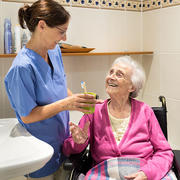
A national study has found that while oral health is one of the greatest unmet healthcare needs for the elderly, geriatric medical fellowship programs provide little oral health training for future doctors who will provide care to the growing older adult population.
The study’s findings, published in the Journal of the American Geriatrics Society, come from a survey of all accredited U.S. geriatric medical fellowship training programs. The Center for Integration of Primary Care and Oral Health (CIPCOH) survey was conducted by the University of Massachusetts Medical School. The majority of respondents (63%) reported that fellows receive only 1 to 2 hours of training in oral health, while almost a quarter (23%) received no training at all.
"By identifying this gap in training, we hope this can lead to an investment in oral health training for geriatricians, and improved access to oral health care for older adults,” said lead author Lisa Thompson, DMD, program director of the Geriatric Dental Fellowship at Harvard School of Dental Medicine (HSDM).
“Many older adults have multiple chronic medical conditions and are simultaneously taking multiple medications which has a huge impact on oral health – geriatricians can be on the front line of helping to prevent oral disease associated with chronic health conditions,” Thompson added.
The study notes that oral disease in older adults can not only amplify chronic and systemic health conditions, but also impact daily life including the ability to communicate, chew and swallow—which can result in poor nutrition, isolation, pain, and lack of sleep among other issues.
“We know that fewer than 50% of older adults regularly visit a dentist to address oral health problems due to lack of dental insurance coverage. Because these patients are more likely to seek care from a medical provider, the need for geriatricians-in-training to be familiar with oral health conditions is essential,” said co-author Christine Riedy, PhD, MPH, Chair and Delta Dental of Massachusetts Associate Professor of Oral Health Policy and Epidemiology at HSDM.
Further analysis of the survey results showed that there are opportunities to promote greater oral health training for residents if there is a faculty champion, or leadership that supports interprofessional education. The authors suggest that geriatric fellowship programs can also tap into existing national and local resources such as the Smiles for Life geriatric oral health module, as many programs cited lack of time to develop oral health curriculum to be a factor.
The study is one of several that focus on the inclusion of oral health curricula and competency within various primary care training programs. The work is a joint endeavor of the academic partner institutions of CIPCOH; the partners include: Harvard Medical School and Harvard School of Dental Medicine (HMS/HSDM), the HMS Center for Primary Care (CPC), and the University of Massachusetts Medical School’s Department of Family Medicine and Community Health (UMMFMCH), in partnership with MCPHS University (formerly the Massachusetts College of Pharmacy and Health Sciences), and Stony Brook University.
